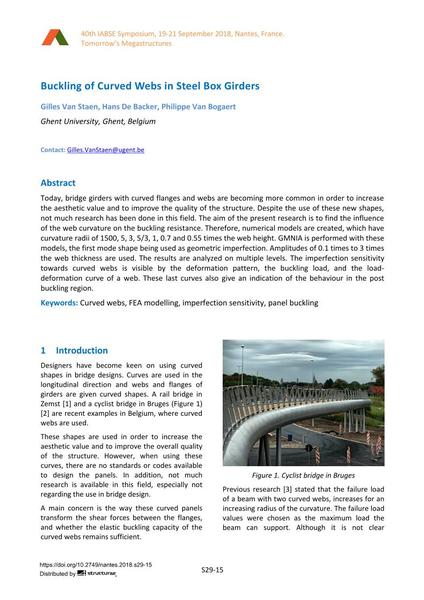Buckling of Curved Webs in Steel Box Girders

|
|
|||||||||||
Bibliographic Details
| Author(s): |
Gilles Van Staen
Hans De Backer Philippe Van Bogaert (Ghent University, Ghent, Belgium) |
||||
|---|---|---|---|---|---|
| Medium: | conference paper | ||||
| Language(s): | English | ||||
| Conference: | IABSE Symposium: Tomorrow’s Megastructures, Nantes, France, 19-21 September 2018 | ||||
| Published in: | IABSE Symposium Nantes 2018 | ||||
|
|||||
| Page(s): | S29-15 | ||||
| Total no. of pages: | 8 | ||||
| DOI: | 10.2749/nantes.2018.s29-15 | ||||
| Abstract: |
Today, bridge girders with curved flanges and webs are becoming more common in order to increase the aesthetic value and to improve the quality of the structure. Despite the use of these new shapes, not much research has been done in this field. The aim of the present research is to find the influence of the web curvature on the buckling resistance. Therefore, numerical models are created, which have curvature radii of 1500, 5, 3, 5/3, 1, 0.7 and 0.55 times the web height. GMNIA is performed with these models, the first mode shape being used as geometric imperfection. Amplitudes of 0.1 times to 3 times the web thickness are used. The results are analyzed on multiple levels. The imperfection sensitivity towards curved webs is visible by the deformation pattern, the buckling load, and the load- deformation curve of a web. These last curves also give an indication of the behaviour in the post buckling region. |
||||
| Keywords: |
imperfection sensitivity Curved webs FEA modelling panel buckling
|
||||
